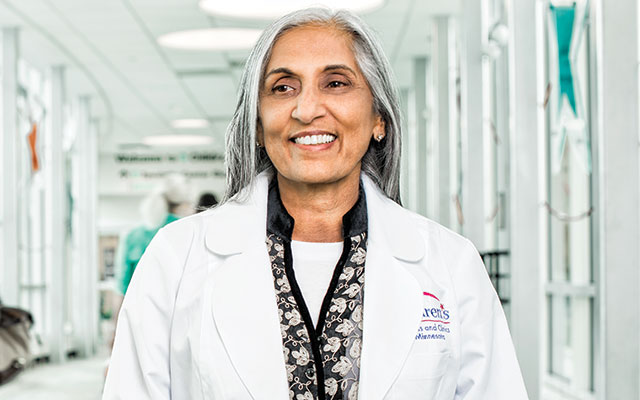Top Doctors 2015: Emerging Medicine
Six Twin Cities Top Docs who are on the forefront of innovation in medicine weigh in on the medical breakthroughs—from healthier kids to better sleep—we can expect in the next 20 years.
by Rhoda Fukushima | July 2, 2021
http://mspmag.com/Health/Articles/Top-Doctors/Top-Doctors-2015-Emerging-Medicine/

Dr. Kiran K. Belani
Pediatric Infectious Disease
COMBATING DISEASE
Kiran K. Belani says it’s not uncommon to have a set career path in her home country, India. For Belani, that path was medicine (there are 10 doctors in her family). She entered St. John’s Medical College in Bangalore at 16. Her specialty is pediatric infectious disease. She is board-certified in pediatrics and pediatric infectious disease and has a diploma in travel/tropical medicine and hygiene. She is on staff at Children’s Hospitals and Clinics of Minnesota.
In 1985, you began caring for the first child in Minnesota to be diagnosed with HIV. You cared for her and other children like her. What was that experience like?
In the early days, children would get hospitalized frequently. It was very hard on the nurses—after doing so much, the children would still die. We didn’t have the drugs. After 1996, we had more drugs. Now we have 30-some drugs, and now it’s almost boring: You see the patients in clinic, you check with their life issues, not disease issues. It’s a total 180-degree turnaround. I wish more diseases would go from life-threatening to a chronic, stable course.
What has been the biggest change in pediatric infectious disease?
The last 30 years in America, we would see so many meningitis cases each week—six or seven in a month. Then they started developing vaccines. It’s two to three cases per year now. In the past, we’d have to tell parents their children would have brain or neurological deficits. We don’t have to say that as often anymore.
In infectious disease, we tend to see more refugees than other fields. We see people from South Asia, Burma (Myanmar), Africa. We see most often tuberculosis, parasitic disease like malaria or gastrointestinal parasites.
Parents are happy they can get help for their children. In their countries, TB can be a death sentence. Coming from another country, I’m sensitive to cultural issues. We have to get to know each community’s different sensitivities. We have interpreters, social workers. It’s not isolating anymore to take care of someone from another country. It’s a daily routine.
What are your thoughts on vaccinations?
Vaccinations are the greatest thing that happened in the last 70 years. These diseases are not simple diseases. They can cause harm and last the lifetime of the child. The problem is that people aren’t seeing the diseases around them. But they are just a plane ride away. There’s measles, whooping cough, diphtheria in other countries. When you don’t see a bad thing, you don’t think about it. You get complacent. I try to give patients the facts. I give them the data. Look at it then, look at it now.
What are the lessons of Ebola?
We need a little more planning ahead—I think this is happening. We have so many treatments and resources, but we don’t have medical literacy—understanding how Ebola is spread. When there is panic and fear, there is not enough communication about the pathology to the people suffering. The more complicated medicine gets, the more time we have to spend educating families and parents.
What ongoing research or projects in your field excite you today?
We are seeing more new drugs for tuberculosis. The drugs in HIV are a tremendous help. I have a picture of a patient with a dinner plate full of the 25 medications she took for HIV. Now patients like her come to the office for a single pill with three drugs in them. It’s very exciting.
Genetics is very exciting—where you tailor the medicine to the patient’s specific genetic needs. Suppose you have a problem with one medication. In the future, we’ll be able to tell we can’t use it. It’s customizing.
What innovations are on the horizon?
Getting to know the body’s natural flora is very trendy right now. There is research into bacteria living in us and their role. How are they helping us? How are they not helping us? That understanding will help chronic disease.
What would you like to see accomplished in the next 20 years?
Health for the rest of the world. I travel to India a lot. There are still tons and tons of people who don’t have vaccinations, antibiotics. They die of simple things. Gaps between advances here and gaps in other countries like India are big, but it is improving.

